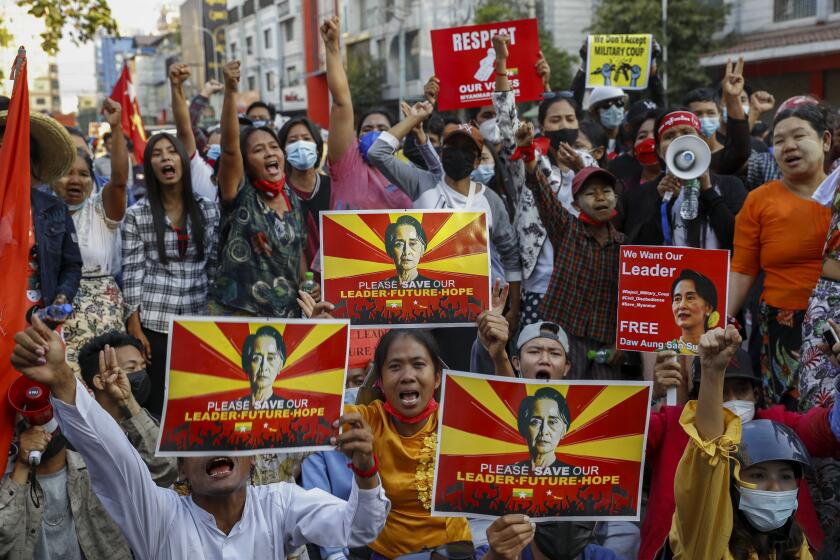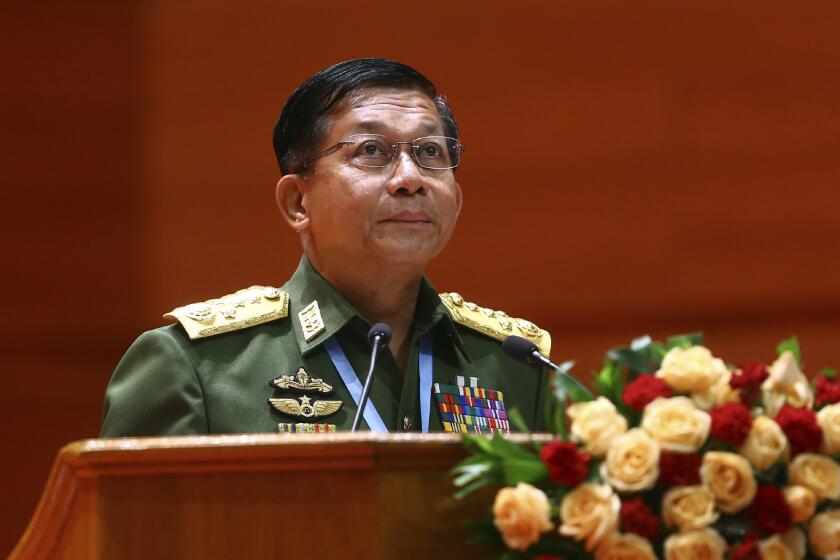‘We will not run!’: 19-year-old’s death inspires Myanmar protesters — and inflames crisis
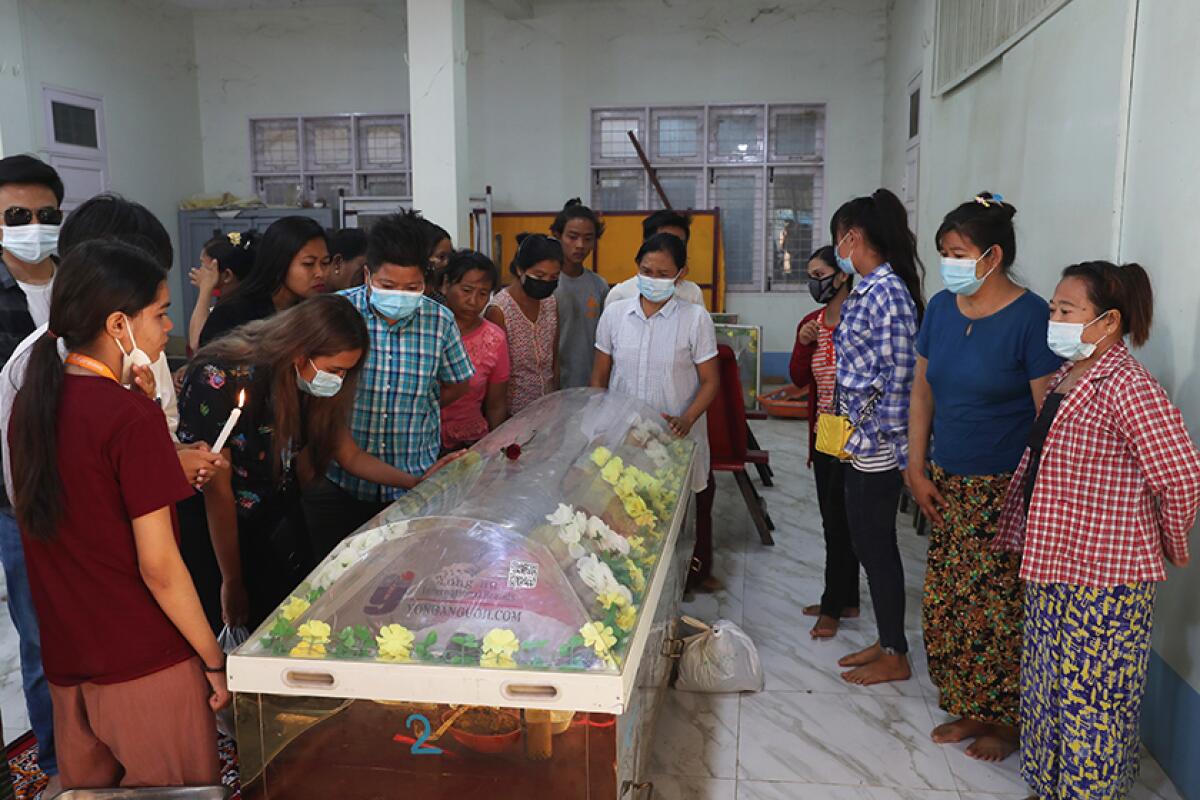
- Share via
SINGAPORE — Like many young people in Myanmar, Kyal Sin recorded a carefree adolescence on her Facebook page: selfies with puckered lips, encounters with puppies and birthday celebrations with friends.
On Wednesday, images of the 19-year-old were splashed across social media for a different reason when the final moments of her life were caught on camera at a protest in Mandalay.
Wearing a black T-shirt that said “Everything will be OK,” she could be heard on video rallying anti-coup demonstrators, shouting: “We will not run!” Soon after, she was killed by a bullet to the head.
Kyal Sin, also known as Angel or by her Chinese name, Deng Jia Xi, has emerged as an early martyr and symbol of resistance against a military junta intent on using growing violence to suppress a protest movement that shows no signs of letting up. Images of Kyal Sin were already appearing Thursday — the same day as her funeral — at demonstrations across the nation of 54 million people.
Her death comes as a raging political crisis threatens to spiral into a humanitarian one in a country that was struggling with economic hardship and ethnic conflict well before the military ended 10 years of democratic reforms by deposing the country’s civilian government in a Feb. 1 coup.
Tens of thousands of residents have taken to the streets demanding an end to the junta and the release of leaders of the National League for Democracy, including the party’s standard-bearer, Aung San Suu Kyi.
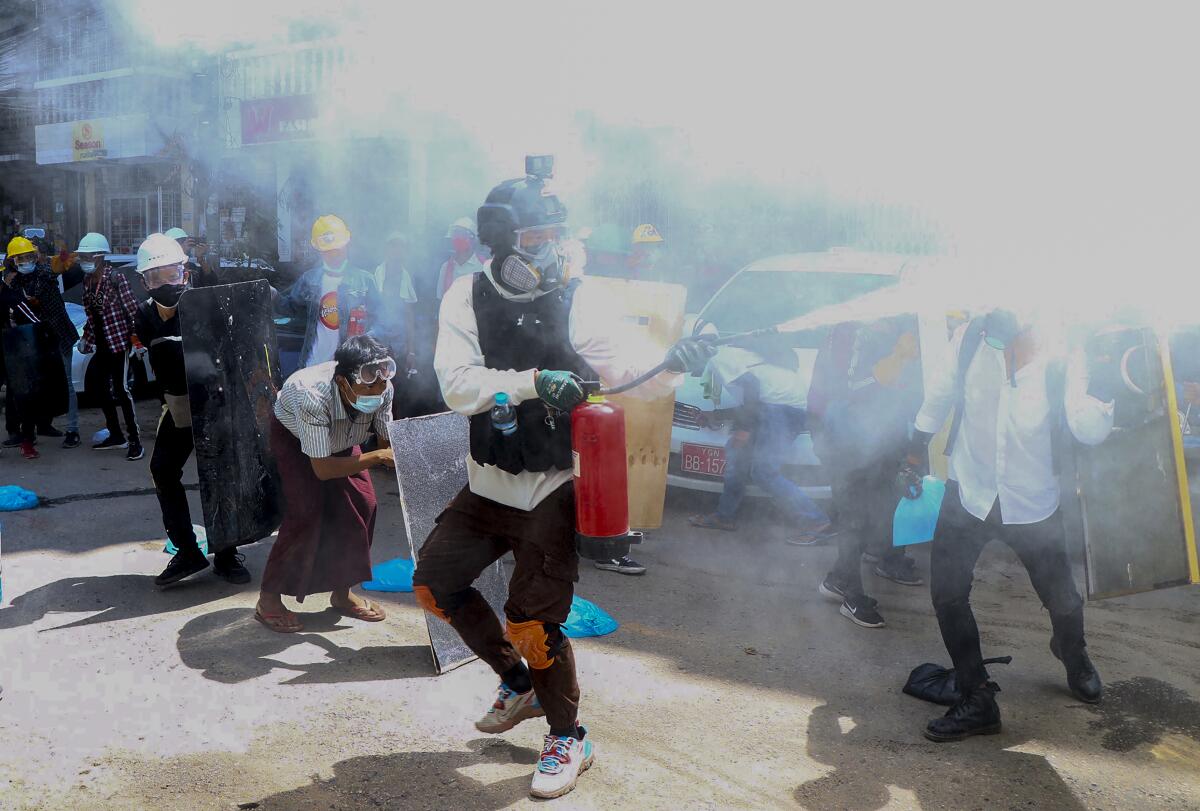
The military seized power over groundless claims of voter fraud in a general election in November that the league won in a landslide. Suu Kyi and other senior figures remain under house arrest and face what critics say are trumped-up charges.
The military leadership has remained defiant in the face of growing international pressure, telling a United Nations special envoy that it was prepared to withstand sanctions and isolation to maintain its grip on power.
That doesn’t bode well for Myanmar’s growing hunger, poverty and unemployment, all of which have been worsened by the COVID-19 pandemic. The country’s brittle economy has been battered by a lack of tourism and shuttered garment factories — and it can ill afford to see the flight of foreign investment.
On Thursday, demonstrators returned to the streets after at least 38 people were killed by security forces across the country Wednesday in the single bloodiest day yet since the coup.
So far, at least 61 people have been killed and 1,400 arrested by the junta’s forces, according to Fortify Rights, a human rights group.
Despite daily internet blackouts, cellphone videos and photos of military and police brutality are emerging daily from Myanmar, which is also known as Burma.
Staged car breakdowns, blocked railway tracks and civil servant strikes are putting pressure on the junta and raising fears of a harsh crackdown.
In one clip that’s gone viral, security forces are seen clobbering detained medical workers with a rifle butt and destroying their ambulance. Another shows a detainee being shot point-blank and the person’s lifeless body being dragged away. Soldiers were also captured on video shooting into homes.
Men armed with guns and dressed in Myanmar army uniforms have also appeared on TikTok threatening to kill demonstrators and supporters of Suu Kyi.
None of the videos could be independently verified as authentic.
The specter of death, injury or arrest has not deterred the mostly young demonstrators, who have remained nonviolent. To do otherwise would give security forces a pretext to crack down more harshly, they say.
While theirs is still a leaderless movement, protesters have shown greater organizational skills in recent days, similar to those adopted by pro-democracy demonstrators in Hong Kong two years ago.
Barricades are being erected on major thoroughfares to impede the movement of police and soldiers. Helmets, goggles and makeshift shields are being distributed to help protect protesters from batons and rubber bullets. Demonstrators are carrying bottles of water for pouring into the eyes of tear-gas victims.
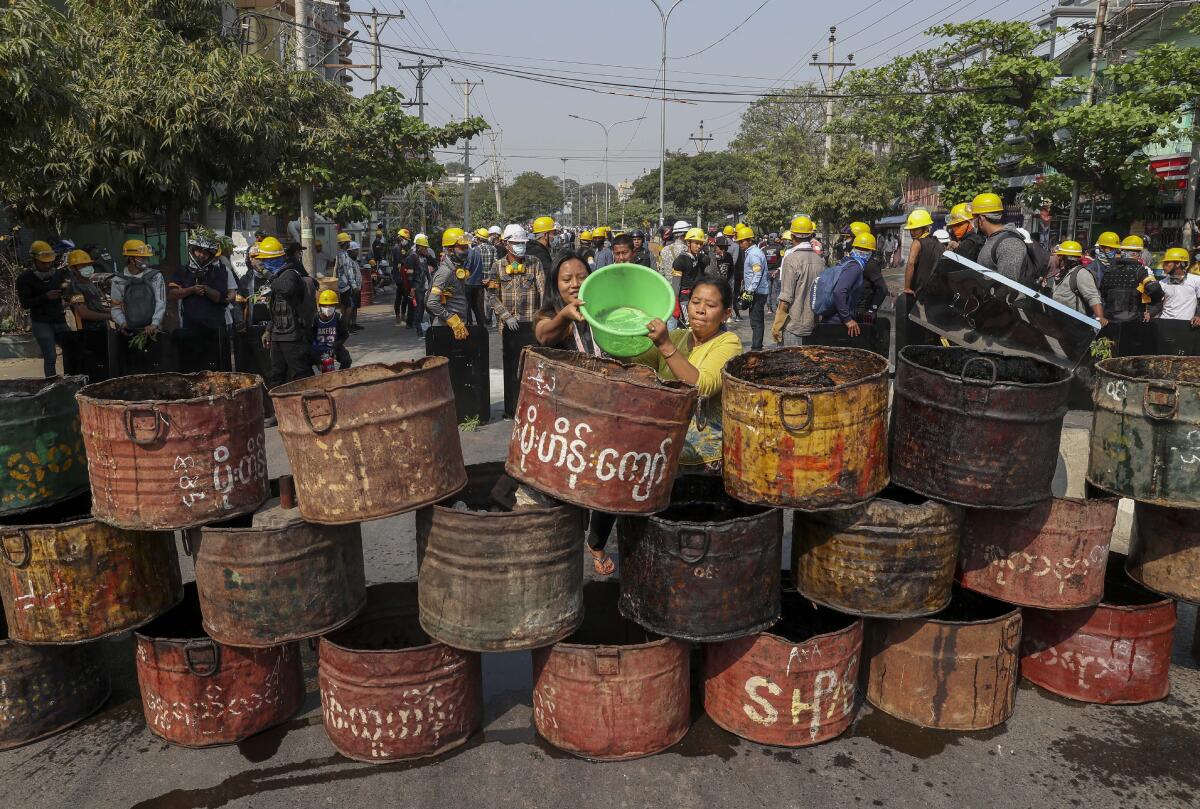
“The police were bullying the people with their weapons. We can’t stand it,” said a protester in Yangon who gave his name as Felix. He was wearing a gas mask, a white hard hat and thick red gloves to pick up and remove hot tear-gas canisters.
Felix said he and his friends formed a group called Civil Defense Line and pooled their money and donations to buy equipment.
“We need this because we’re on the front lines and we don’t know what’s going to happen to us,” he said.
Unlike the popular uprisings of 1988 and 2007, which were brutally crushed, Myanmar’s demonstrators today have the benefit of social media to sustain the movement and build solidarity.
Myanmar’s military already held vast economic and political power. Now it has to govern a country grappling with health and economic crises.
More than half the country is believed to use Facebook, which has helped spread a civil disobedience movement that’s ground Myanmar to a near-standstill with walkouts at government offices, banks, rail yards, ports and hospitals.
“People will not back down,” youth activist Thinzar Shunlei Yi said Thursday as she prepared to join protesters in Yangon. “Once we’re outside, we already perceive ourselves as dead bodies. We know what we are facing: a true terrorist group.”
Analysts say the armed forces, known as the Tatmadaw, are trying to intimidate protesters with live ammunition and an overwhelming show of force — demonstrated by the flybys of warplanes in Mandalay on Thursday.
“They’re trying to bleed the protest movement,” said Hunter Marston, a Southeast Asia researcher at the Australian National University. “They want to scare protesters so that they stay at home. But young people will not accept military rule. They can’t go back to that after growing up with democracy. Things are coming to a head. Neither side will back down.”
Burmese punk band Rebel Riot’s lead singer embodies the growing outrage over the military coup. He’s now rallying others to resist.
The Tatmadaw, led by Senior Gen. Min Aung Hlaing, is believed by some observers to have miscalculated the extent to which civilians would resist the military takeover and support Suu Kyi.
The coup came after two bruising general elections — one last November, the other in 2015 — for the Tatmadaw, which showed that it and its proxy political party stood little chance of ever winning enough parliamentary seats to form a government. Suu Kyi’s National League for Democracy won both in a landslide.
Analysts say Min Aung Hlaing hopes to disqualify Suu Kyi’s party, preventing it from running in new elections, which the junta has promised to hold in a year. That could provide the veneer of legitimacy to a Tatmadaw victory at the polls.
But it will be a tall order if millions choose to boycott new elections and continue to defy the military regime. That heightens the risk that Myanmar will languish for years under brutal army dictatorship, as it did for nearly five decades after a coup in 1962.
“The military have dug an extremely deep hole for themselves,” Richard Horsey, a Myanmar-based analyst, wrote in a post for the International Crisis Group. “Even if they could turn back the clock, most people aren’t going to accept a return to the previous status quo. It’s hard to see this going well for anyone from here, not for the country, not for the people, not for the economy and not for the military itself.”
Breaking News
Get breaking news, investigations, analysis and more signature journalism from the Los Angeles Times in your inbox.
You may occasionally receive promotional content from the Los Angeles Times.
That almost certainly means the loss of more innocent life, such as Kyal Sin’s.
Photos on social media showed demonstrators holding up pictures of her in her “Everything will be OK” T-shirt, with goggles dangling around her neck.
She was a dancer and taekwondo instructor who appeared also to have had a budding singing career. She had posted music videos of herself on Facebook and YouTube.
Her funeral Thursday was attended by scores of pro-democracy supporters who waved the ubiquitous three-fingered salute of resistance adopted from the “Hunger Games” movies.
Her death drew a rebuke to the junta from Burmese American mixed martial arts champion Aung La Nsang on Instagram.
“Having a daughter myself, my heart aches [for] her father and her family,” he wrote. “She loved martial arts and she died wearing a shirt that read ‘Everything will be OK.’ If the world waits and watches, there will be a lot more bloodshed and deaths.”
Special correspondent Andrew Nachemson in Yangon contributed to this report.
More to Read
Sign up for Essential California
The most important California stories and recommendations in your inbox every morning.
You may occasionally receive promotional content from the Los Angeles Times.
